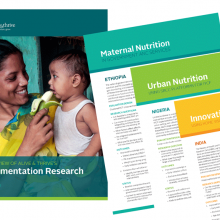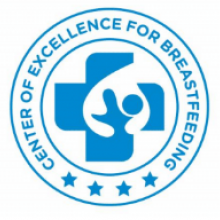Brief, Handout
Oct 28 2020

An overview of Alive & Thrive's implementation research
Alive & Thrive's implementation research spans its program areas, seeking to answer "how" to implement effective interventions and policies. Active studies are detailed in the attached documents.
Journal article
Jul 16 2020

National nutrition strategies that focus on maternal, infant, and young child nutrition in Southeast Asia do not consistently align with regional and international recommendations (Maternal & Child Nutrition, 2020)
This study examines the consistency of national nutrition strategies and action plans (NNS) focusing on maternal, infant, and young child nutrition in Southeast Asia with international recommendations.
Journal article
Jul 16 2020

Stop Stunting in South Asia. Improving child feeding, women's nutrition and household sanitation
This overview paper summarizes and builds on papers from the Stop Stunting Conference of 2014, advocating to focus on child feeding, women's nutrition, and household sanitation as investment areas to prevent child stunting in South Asia.
Poster/Graphic
May 02 2020

Viet Nam Centers of Excellence Demand Generation Strategy
360-degree demand push for the Center of Excellence for Breastfeeding (CoE) initiative
Journal article
Jun 01 2019
Integrating Maternal Infant & Young Child Nutrition (MIYCN) in Undergraduate Medical Teaching Curriculum and Service Delivery in Two States of India (P04-162-19)
Journal article
May 07 2019

Maternal nutrition practices in Uttar Pradesh, India: role of key influential demand and supply factors (Nguyen PH., 2019. Maternal Child Nutrition)
Despite strong policy and program commitment, essential maternal nutrition services are not reaching enough women in many countries.

